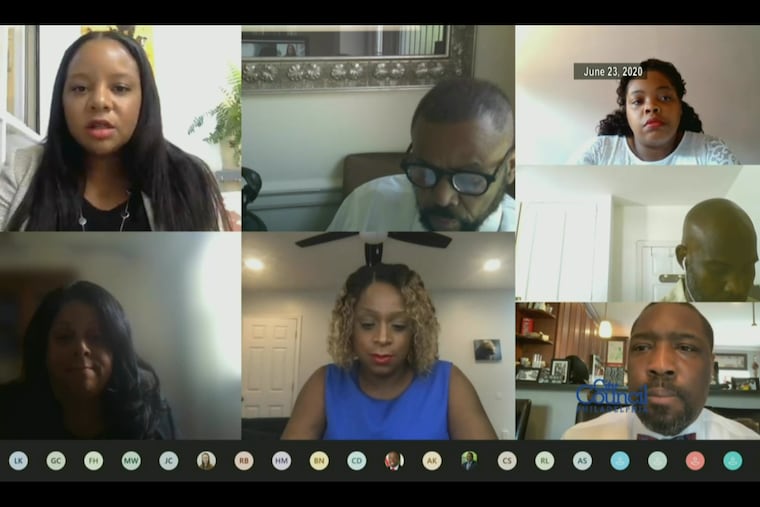Philly City Council is set to pass police reform measures before it goes on summer recess
A Council committee approved bills that would codify the Philadelphia Police Department’s ban on restraining detained subjects with chokeholds, and require a public hearings on proposed police union contracts.

Philadelphia City Council has fast-tracked a package of police reform measures, advancing two bills Tuesday and readying final votes on an additional three measures Thursday, as lawmakers respond to continued protests over police misconduct following George Floyd’s death in Minneapolis.
The Public Safety Committee approved legislation that would codify the Police Department’s ban on officers using choke-holds to restrain detained subjects, and require public hearings on the city’s priorities going into contract negotiations with the police union.
The Law and Government Committee had previously approved legislation that would place a referendum on the Nov. 3 ballot asking voters to decide whether to create a civilian oversight commission on police conduct; another proposed referendum calling on the Police Department to end “unconstitutional stop-and-frisk”; and a bill that would require newly recruited officers to have lived in the city for at least one year before they are hired.
Those three bills will come up for final passage Thursday, in Council’s final meeting before its scheduled summer break. The two that advanced out of committee Tuesday in unanimous voice votes will likely have to wait until lawmakers return in the fall before receiving their required second reading before the full Council.
The push for reform is likely to continue unabated. More than three weeks after demonstrations against police violence began in Philadelphia following Floyd’s death, protesters continue to press local officials to act. During the committee’s virtual meeting Tuesday afternoon, demonstrators chanting “Defund the police” took over the Municipal Services Building lobby.
Councilmember Katherine Gilmore Richardson wrote the bill advanced Tuesday that would require public testimony in Council hearings on mayoral administrations’ initial proposals when negotiating contracts with Fraternal Order of Police Lodge 5. Many of the policy areas in which protesters have sought reforms are governed by the police union contract, including the disciplinary arbitration process that has allowed scores of Philadelphia officers in recent years to have their sanctions for alleged inappropriate behavior reduced or reversed.
“Transparency and accountability are crucial. They’re crucial to creating trust between the public and government,” Gilmore Richardson said. “We cannot create change behind closed doors.”
Rich Lazer, deputy mayor for labor, said Mayor Jim Kenney’s administration supported the bill. He noted that the administration has previously pushed for some of the changes the protesters want, including changes to the disciplinary process. Although the administration already seeks input from stakeholders before finalizing its initial proposal in the FOP negotiations, a public hearing would likely result in additional changes before the city submits its offer, he said.
With Kenney in the first year of his second term, the administration had planned to spend much of the first half of 2020 negotiating contracts with the four major municipal unions. After the coronavirus struck Philadelphia, however, Kenney pushed through one-year deals that largely extended the terms of the previous contracts and included raises ranging from 2% to 2.5%. The move was designed to delay talks over longer-term deals until city leaders would have a better understanding of the pandemic’s impact on municipal finances, as well as the time to focus on the contracts after the crisis.
The extension deal for the FOP, however, has since come under intense criticism because it gave raises to cops without securing concessions such as changes to the disciplinary process, which is a typical strategy for mayors seeking reforms.
City Controller Rebecca Rhynhart on Tuesday testified in support of Gilmore Richardson’s bill and encouraged Council members to require similar public hearings for contracts with the other three unions, which represent firefighters, and nonuniformed blue- and white-collar workers. Employee salaries and benefits are the biggest costs for the city, and the contracts, which are negotiated behind closed doors between union leaders and the mayor’s administration, dictate the compensation for a vast majority of the city’s workforce.
“Transparency is always important to rooting out waste, fraud, and abuse,” said Rhynhart, the city’s independently elected fiscal watchdog. “The more transparent and the more input that people have, the less fraud and abuse there is.”
Councilmember Kenyatta Johnson wrote the other bill approved in committee Tuesday — prohibiting police officers from restraining subjects in certain ways — after reviewing the department’s regulations following Floyd’s death after a Minneapolis police officer knelt on his neck for almost nine minutes.
The impact of the bill would be limited because the department already bans many of the practices outlined in the text and because in Pennsylvania, much of the law on police officers’ use of force is decided at the state level.
Police Commissioner Danielle Outlaw said that while her department’s policy already prohibits officers from choke-holds and kneeling on detained people’s backs, for instance, ”it did not expressly prohibit kneeling on a subject’s neck,” as the bill does.
“This is not necessarily a change in departmental policy, but rather a necessary clarification,” said Outlaw, who supports the bill.
Councilmember Jamie Gauthier raised concerns that the bill included an exception for circumstances in which officers fear for their lives or “serious injury.”
“I support this bill,” Gauthier said, “but I do think that it would be stronger if it were able to define more around what ‘serious injury’ looks like.”